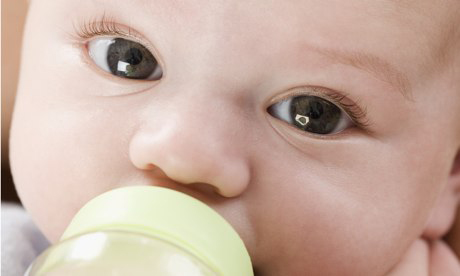
|
The scientists are at odds with the FSA, whose recent study on toxicity concluded there was no cause for concern. Scientists are defying government experts to warn that babies are being exposed to high levels of aluminium in formula milk, which they claim could damage their health. Professor Christopher Exley and colleagues from Keele University have looked at the aluminium content of 30 brands of formula milk and say it is too high. Their study follows a similar survey they carried out in 2010, which was limited to 15 products. In the interim, they say, manufacturers have done nothing to reduce the amounts of the chemical to which babies are exposed. They claim aluminium is linked to cancer and Alzheimer's disease in later life. The scientists are at odds with the Food Standards Agency, the government advisory body on safety. Its committee on toxicity recently looked at aluminium in formula milk and concluded there was no cause for concern. Their independent experts "concluded that the estimated exposures of infants to aluminium from the dietary sources did not indicate toxicological concerns or a need for a change in government advice," said an FSA spokesman. Exley does not agree, arguing that the committee's experts relied on an arbitrary standard based on a limited number of animal studies, which he described as meaningless. He said: "Since we are one of the leading groups, if not the leading group, working on aluminium and human health in the world, you might think our opinion would have some meaning for organisations like the FSA. Unfortunately the FSA is another arm of the government and the government is not going to do or say anything which might upset industry and the aluminium industry in particular." "It is the attitude of government which is preventing any legislation in relation to exposure to aluminium and human health and this attitude fosters complacency within industry, in this case infant formula manufacturers, allowing them to do nothing about the potential time bomb which is our burgeoning exposure to aluminium." His team argues that aluminium in baby milk should be reduced to the lowest possible level. In the study, published by BMC Paediatrics , they draw up a league table of formula milk by aluminium content. They found that two soya milk brands had the highest content, but SMA toddler milk and Hipp Organic first infant milk also had high levels. Among ready-to-drink types, SMA toddler milk had the lowest concentration, followed by Hipp Organic first infant milk, Aptamil hungry baby milk, SMA first infant milk and Aptamil first milk. The growing up milks produced by Cow and Gate and Aptamil had the highest concentrations, with Aptamil toddler milk having almost three times as much aluminium as SMA toddler milk. For powdered milks, Hipp Organic growing up milk had the lowest level, followed by Aptamil hungry, Aptamil first milk and Hipp Organic follow-on milk. Aluminium is also found in tap water and in breast milk, although the concentration is significantly lower.A spokeswoman for SMA said: "We would like to reassure parents that all SMA infant formula is safe. "Aluminium occurs naturally in the environment and is present in many fruits, vegetables, packaged foods, beverages and water. We take every precaution to ensure the level of aluminium in our products is kept as low as possible. "As you would expect all our infant formula undergoes rigorous testing and assessment to ensure its safety. "The amount of aluminium in SMA products is well below the guidelines set by the European Food Safety Authority. "The safety and quality of our products is our number one priority." |
國家食品標準局最近對嬰兒配方奶毒性反應的研究稱大家不用擔心鋁含量的問題,但是科學家與其意見不一致。 科學家不認同政府專家的觀點,警告大家嬰兒所喝的配方奶中,鋁元素含量過高,這將會損害他們的健康。 克里斯多夫?埃斯利教授和他來自英國基爾大學的同事研究了三十種配方奶中的鋁含量,發(fā)現(xiàn)鋁含量過高。在本次研究之前,他們在2010年就做過一個類似的調(diào)查,那次調(diào)查僅研究了15種產(chǎn)品。他們說,在這兩次調(diào)查期間,制造商沒有采取任何行動減少嬰兒用品中的化學物質(zhì)含量。他們聲稱鋁元素會導致晚年生活患上癌癥和阿茨海默癥。
他們的獨立專家“得出結論說嬰兒從膳食來源獲取的鋁元素估算值不會產(chǎn)生毒性擔憂問題,也沒有必要改變政府的建議。”食品標準局發(fā)言人說。 埃斯利不同意他的說法,爭論道說委員會的專家依賴的是基于有限數(shù)量動物研究得出的專橫標準,在他看來,這個標準是沒有意義的。他說:“我們不是致力于世界鋁元素和人類健康的領導團隊,但是我們是其中一員,人們可能認為我們的觀點會對像食品標準局這樣的機構產(chǎn)生一些影響。不幸的是,食品標準局是政府的另一支臂膀,政府不會做出或者說出損害工業(yè),尤其是制鋁工業(yè)的事情或言論。”
在自來水和母乳中也發(fā)現(xiàn)了鋁元素,盡管濃度很低。惠氏公司的一名女發(fā)言人說:“我們向家長保證,所有的惠氏SMA嬰兒配方奶品都是安全的。” “鋁元素在環(huán)境中自然存在,在很多水果、蔬菜、袋裝食品、飲料和水中也都有鋁元素。我們要采取所有的預防措施來保證我們產(chǎn)品中鋁元素的含量保持在很低的水平。” “就像你們所期待的,我們所有的配方奶粉都經(jīng)受了嚴格的測試和評估來確保其質(zhì)量。” “惠氏產(chǎn)品中的鋁含量要遠低于歐洲食品安全局設立的標準。” “產(chǎn)品的安全和質(zhì)量問題是我們優(yōu)先考慮的事情。” (譯者 鳳凰花開的路口 編輯 丹妮) |
